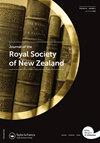He Pito Mata–唤醒潜力
IF 2.1
4区 综合性期刊
Q2 MULTIDISCIPLINARY SCIENCES
引用次数: 0
摘要
He Pito Mata于2021年年中由皇家学会Te Apārangi早期职业研究者论坛主办,是一场雄心勃勃的活动,300多名早期职业研究人员聚集在一起,为期两天。在Whanganui-a-tara期间,这些研究人员探索了新西兰Aotearoa研究景观的性质、他们共同经历的问题和担忧,以及他们对未来的希望。这不是例行的学术会议。这是一次非同寻常的活动,将来自大学、皇家研究院(CRIs)、wānanga和私人研究组织的早期职业研究人员团结在一起。受邀嘉宾包括首席执行官、政府科学顾问、高级学者、记者、诗人和毛利语专家。其目的是连接、分享和扩大澳泰罗亚早期职业研究人员的kōrero,并在这样做的过程中重新设想新西兰澳泰罗阿研究部门的未来。这是一个非常激动人心的事件,对参与者产生了深远的影响。He Pito Mata的遗产项目之一是这本增刊,它介绍了一些早期职业研究人员对各自知识领域的贡献。所有300名He Pito Mata参与者都被邀请投稿,我们收到了48份投稿(非常困难),这些投稿被缩减为您在这里找到的12篇文章。我们的选择基于两个标准:;首先,提交的材料必须是不言而喻的优秀;第二,他们需要面向多面手。在这方面,最后十二篇文章并没有充分体现早期职业研究人员进行的研究的多样性,其中大部分都是针对更多的专业受众。此外,与此类收藏中的情况一样,由于面临多项承诺的挑战,我们的一些贡献者半途而废。最后,我们要感谢Tara McAllister博士,他参与了最初的选拔过程:感谢你们为加强我们的研究系统所做的一切;solesolevake sa itakele ni duavata。我们对由此产生的补编的内容感到非常自豪。首先,我们对谁在这里感到兴奋。考虑到新西兰研究部门人口结构的变化,以及人们普遍认为需要更具包容性的研究组织,令人鼓舞的是,该补充资料介绍了如此多的毛利人和帕西菲卡学者及其奖学金。这表明,选择不言自明的优秀人才本身就可以增强我们行业的多样性和包容性。值得注意的是,有多少文章是基于以合作和关系为中心的研究项目。我们看到了明确的证据:高级研究人员指导初级研究人员;参与者也是合作者和合著者;研究和研究的新模式,是其他人如何在全国和全球范围内追求这一目标的模式。更多本文章由计算机程序翻译,如有差异,请以英文原文为准。
He Pito Mata – awakening the potential
Hosted by the Early Career Researcher Forum of Royal Society Te Apārangi in mid-2021, He Pito Mata was an ambitious event that brought over 300 early career researchers together for two days. During their time in Whanganui-a-tara these researchers explored the nature of Aotearoa New Zealand’s research landscape, the issues and concerns they collectively experienced, and their hopes for the future. This was no regular academic conference. Explicitly framed as an opportunity to wānanga, with an emphasis on creating shared opportunities to learn, this was an extraordinary event that united early career researchers from Universities, Crown Research Institutes (CRIs), Wānanga and private research organisations. Invited guests included CEOs, Government Science Advisors, senior academics, journalists, poets, and experts in mātauranga Māori. The aim was to connect, share and amplify the kōrero of early career researchers in Aotearoa, and in doing so re-envision a future for Aotearoa New Zealand’s research sector. It was a hugely stimulating event that had a profound impact on those who took part. One of the legacy projects from He Pito Mata is this Supplement which profiles the contributions of some of these early career researchers to their respective intellectual fields. All 300 He Pito Mata participants were invited to contribute, and we received 48 submissions which (with great difficulty) were whittled down to the twelve articles that you find here. Our selections were based on two criteria; first, the submissions needed to be self-evidently excellent; and second, they needed to be targeted towards a generalist audience. In this regard, the final twelve articles do not capture the full diversity of research conducted by early career researchers, much of which is focused at much more specialist audiences. Also, as is always the case in such collections, some of our contributors fell by the wayside due to the challenges of juggling multiple commitments. Finally we wish to acknowledge Dr Tara McAllister who was part of the initial selection process: vinaka vaka levu e hoa for all that you do to bring strengthen our research system; solesolevake sa itakele ni duavata. We are very proud of the content of the resulting Supplement. First, we are excited by who is here. Given the changing demography of New Zealand’s research sector, and the widely acknowledged need for more inclusive research organisations, it is heartening that the supplement profiles so many Māori and Pasifika scholars and their scholarship. This suggests that selecting for self-evident excellence can, in and of itself, enhance diversity and inclusion in our sector. It is also notable how many of the articles are based on research projects that centre collaboration and relationality. We see clear evidence of whanaungatanga: senior researchers mentoring junior researchers; participants who are also collaborators and co-authors; new models of researching and research that are models for how others aspire to this nationally and globally. More
求助全文
通过发布文献求助,成功后即可免费获取论文全文。
去求助
来源期刊

Journal of the Royal Society of New Zealand
综合性期刊-综合性期刊
CiteScore
4.60
自引率
0.00%
发文量
74
审稿时长
3 months
期刊介绍:
Aims: The Journal of the Royal Society of New Zealand reflects the role of Royal Society Te Aparangi in fostering research and debate across natural sciences, social sciences, and the humanities in New Zealand/Aotearoa and the surrounding Pacific. Research published in Journal of the Royal Society of New Zealand advances scientific knowledge, informs government policy, public awareness and broader society, and is read by researchers worldwide.
 求助内容:
求助内容: 应助结果提醒方式:
应助结果提醒方式:


